The 50th Session of the Human Rights Council
13 June – 8 July 2022
Item 2: Annual report of the United Nations High Commissioner for Human Rights and reports of the Office of the High Commissioner and the Secretary-General
15th June 2022
By Amal Bushara / GICJ
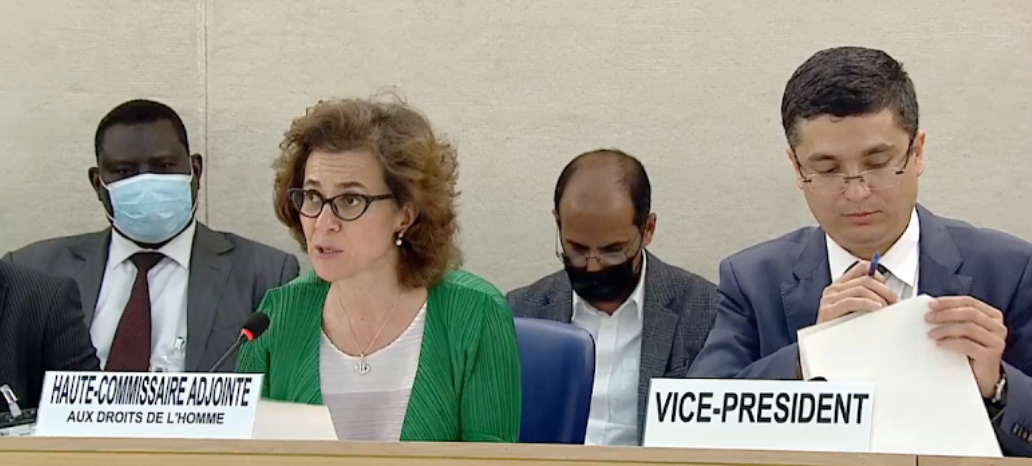
Executive Summary
On the 15th of June, during the 50th session of the Human Rights Council, deputy High Commissioner, Ms Nada Al- Nashif, presented on behalf of the High Commissioner, a report detailing the situation of human rights since, and human rights violations and abuses committed during, the period of the military takeover. The oral update was followed by an enhanced Interactive Dialogue. The Acting Minister of Justice of Sudan and the Head of Human Rights Unit of the Human Rights Bar Association in Sudan were amongst some of the speakers that took to the floor during the interactive dialogue.
The High Commissioner's report, prepared with the assistance of the Sudanese Human Rights Expert, documents the various patterns of human rights violations that have surged during and after the military coup of 25 October 2021, including excessive use of force, unlawful killings, arbitrary arrest, torture, sexual and gender-based violence and attacks on hospitals and medical staff.
The Report notes that joint security forces have used excessive force in the past in reaction to peaceful anti-coup protests, particularly in Khartoum State (Khartoum, Khartoum North and Omdurman). Furthermore, it details that since mid-January 2022, joint security forces have been using shotguns to suppress protests, primarily in Khartoum State but also in Wad Medani, Al-Gazira State. Two men and three boys reportedly died as a result of being hit by shotgun pellets as of 10 April 2022, with at least 367 others injured.
The report also makes recommendations both for the Sudanese authorities as well as the international community. Some of the recommendations include credible steps towards the reinstatement of a civilian-led transitional government and investigate effectively, impartially and in a timely manner any allegation or reasonable suspicion of unlawful use of force or other violations by members of the joint security forces. This also includes sexual and gender-based violence, and to hold accountable those responsible.
During the enhanced dialogue, experts and state representatives alike, expressed their solidarity with the people of Sudan in their struggle for democracy. They called on authorities to put an end to the use of excessive force and their campaign of violence against civilians and celebrated the end of the state of emergency in Sudan, which enabled law enforcement activities to be carried out by joint security forces.
Background
The Sudanese military, led by Lieutenant General Abdel Fattah al-Burhan, Chair of the Sovereign Council and Commander of the Sudanese Armed Forces, conducted a military coup on October 25, 2021. Lieutenant General Abdel Fattah al-Burhan declared statewide emergency status, suspended paragraphs 11, 12, 15, 16, 24, (3), 71, and 72 of the Constitutional Document, and dissolved the Sovereign Council and Council of Ministers in a televised address.
The declaration of the state of emergency did not comply with the international notification obligation set forth in article 4 (3) of the International Covenant on Civil and Political Rights, requiring states to provide a date for when they plan to exercise the right to derogation, which generally refers to the suspension or suppression of a law under particular circumstances.
The coup d'état sparked protests, strikes, and civil disobedience activities, and was widely criticised, notably by the UN Secretary-General and the UN High Commissioner for Human Rights. However, the pro-democracy movement was sidelined by the excessive and indiscriminate use of force, as live ammunition was fired on peaceful protestors.
Noting the declining human rights situation in Sudan, on November 1, 2021, the Permanent Representative of the United Kingdom of Great Britain and Northern Ireland to the United Nations Office in Geneva, in collaboration with the Permanent Representatives of Germany, Norway, Sudan, and the United States of America, requested that the Human Rights Council hold a special session to address the human rights implications of the ongoing situation in Sudan.
Austria, Brazil, Bulgaria, Czechia, Denmark, France, Italy, Japan, Libya, Mexico, the Netherlands, Poland, the Republic of Korea, Sudan, Ukraine and Uruguay are among the 18 members of the Human Rights Council who support the above-mentioned request. Sudan then disassociated itself from the effort on 2 November 2021 and demanded that its name be removed from the list of Council members who had requested the extraordinary session's convening.
Following numerous meetings with the primary sponsors, and after gaining support of 1/3 of the members of the Council, the President of the Human Rights Council agreed to host an open-ended informational consultation on the organisation of the Special Session on 3 November 2021, and to hold the Special Session on 5 November 2021.
During the Special Session, resolution A/HRC/RES/S-32/1 was adopted. It expresses some support for Sudan's legitimate government, but strongly condemns the military coup and the accompanying serious human rights atrocities that the military is directly responsible for. It also appoints an independent expert to oversee the situation until the legitimate government reclaims power. This resolution also mandates the High Commissioner’s report on Sudan as it “calls upon the High Commissioner and the designated Expert to monitor human rights violations and abuses and to continue to bring information thereon to the attention of the Human Rights Council, and to advise on the situation if it continues to deteriorate.’’
Report
Report A/HRC/50/22 covers the period from 25 October 2021 to 10 April 2022 and focuses on the state of human rights in Sudan since the military takeover, as well as human rights violations and abuses that occurred during that time. The document was provided to Sudanese officials ahead of time for factual feedback on the recorded observations and facts. With the cooperation and support of the Sudanese authorities, the Sudanese Human Rights Expert, Adama Dieng, visited Sudan from 20 February to 24 February 2022. The Expert met with senior officials, civil society representatives, human rights defenders, victims, witnesses, and families of victims of human rights violations regarding the report.
These encounters enriched the Expert’s understanding of Sudan's human rights situation as well as the country's diverse social, civil, economic, political, and cultural rights concerns. The report is based on information gathered by the Expert with the assistance of and in collaboration with the UN joint human rights office in Sudan, including interviews with over 100 victims and eyewitnesses, site visits, and evidence analysis, including medical evidence, photographs, and video footage.
Regarding the use of excessive force, the report notes that security officers have fired tear gas canisters and shock grenades towards the upper body or heads of protesters on numerous occasions, leading to significant casualties. According to medical reports, almost 30% of the injuries were caused by this excessive use of force. Notably, at a demonstration in Khartoum on November 30, an injured protester reported that a police officer in a dark blue uniform fired a tear-gas canister from close range at his face, causing a major head injury.
The Expert and the joint human rights office reported the arbitrary arrest and incarceration of 1,293 people associated with the coup or anti-coup rallies between 25 October 2021 and 10 April 2022, including 143 women and 157 children.. This number does not include those who were detained for a short time and then released without charge. Since the coup, the UN monitoring and reporting mechanism on children and armed conflict has documented 222 child rights violations, including arbitrary arrest and imprisonment of children for participating in rallies (157), injuries (46) and deaths (15) of children, and one school attack. Boys made up 97 percent of the victims (209).
Sexual and gender-based violence is also documented in the report. Through interviews with victims and witnesses, the Expert and the joint human rights office were able to confirm 13 incidences of rape, gang rape, attempted rape, and other kinds of sexual and gender-based violence that occurred in Khartoum during the reporting period. There were 14 victims in total (10 women, 1 girl, 1 man and 2 boys). Other claims of similar assaults are currently being investigated. The majority of confirmed instances of sexual and gender-based assault occurred in Khartoum on the evening of 19 December 2021, while the victims were leaving protests sites.
During the reporting period, the joint human rights office confirmed that security personnel forced their way into eight hospitals in Khartoum during protests. The major targets were hospitals and other medical facilities located along the main protest routes. At least three of these hospitals have been targeted three times including Al-Arbaeen hospital, Khartoum teaching hospital, and Al-Faisal hospital. The surgical unit of Al-Arbaeen hospital was reportedly targeted by tear-gas canisters shot by Riot Police and Central Reserve Police on 17 November 2021.
In addition, widespread abuses of the right to a fair trial and due process rights were noted, including the refusal of detainees' rights to legal representation and appearing before a competent judge. Detainees were denied access to their counsel and were unable to argue the legality of their detention before a judicial body from the period of 25 October until mid-December 2021. This weakened minimum safeguards, leaving victims of arbitrary arrest and imprisonment without legal protection, subjecting them to the prospect of and actual acts of torture and ill-treatment, incommunicado detention, and enforced disappearances, leaving them without effective remedies.
The High Commissioner for Human Rights sets out recommendations in the report to ensure the protection of human dignity and justice. The recommendations for the Sudanese authorities include conducting independent, impartial, prompt, thorough, and effective investigations into all allegations of attacks, harassment, and intimidation of human rights defenders, journalists, and media personnel. Regarding the international community, the High Commissioner recommended, amongst other things, that they identify ways to provide aid to individuals in need, especially through programmes like the family support programme, given the suspension of financial support since the coup.
Enhanced Dialogue
During the Enhanced Interactive Dialogue on the High Commissioner's Report on Sudan, the delegate for the United Kingdom expressed solidarity with the Sudanese people. The state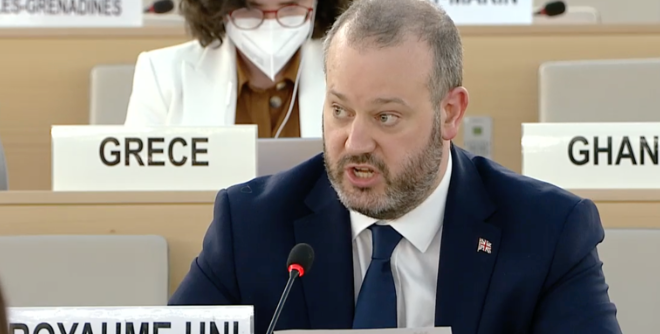 representative of the UK noted that while the human rights situation in Sudan has deteriorated after the military coup, there have been some encouraging advances recently. The termination of the state of emergency on May 29th, as well as the freeing of some political detainees, are welcomed developments. It was noted however that there is more to be done. The representative stated that all activists and protestors who have been arbitrarily detained must be released. The use of excessive force against demonstrators, as well as sexual and gender-based violence, must stop. To aid reconciliation and promote progress, individuals who have violated human rights must be held accountable without impunity. Finally, the UK's representative stated that for there to be hope for a return to civilian-led administration and a democratic society, all parties must fully participate in the current discussions facilitated by the United Nations, African Union, and Intergovernmental Authority on Development.
representative of the UK noted that while the human rights situation in Sudan has deteriorated after the military coup, there have been some encouraging advances recently. The termination of the state of emergency on May 29th, as well as the freeing of some political detainees, are welcomed developments. It was noted however that there is more to be done. The representative stated that all activists and protestors who have been arbitrarily detained must be released. The use of excessive force against demonstrators, as well as sexual and gender-based violence, must stop. To aid reconciliation and promote progress, individuals who have violated human rights must be held accountable without impunity. Finally, the UK's representative stated that for there to be hope for a return to civilian-led administration and a democratic society, all parties must fully participate in the current discussions facilitated by the United Nations, African Union, and Intergovernmental Authority on Development.
Acting Minister of Justice of the Sudan, H.E. Mr Mohammed Saied Al-Hilo, noted that the state had made continuous efforts to address both legal and institutional issues. In regards to the country’s justice organs, H.E. Mr Mohammed noted that they were competent and inclined to facilitate fair rulings and promote accountability. Nevertheless, he called on members of the international community to further assist the state in its journey towards democracy and to provide technical assistance. Finally, Sudan’s Minister of Justice announced that in order to overcome its challenges, the government is launching a thorough nationwide action plan. This plan will address various negative phenomena that threaten social cohesion and threaten peace in the country and will includes activities, such as programmes for national reconciliation and state policies aimed at countering intolerance, racial and ethnic bullying, discrimination and the promotion of hatred. The plan also includes combating poverty, transnational crime and human exploitation.
The delegate for Iceland speaking on behalf of the Nordic-Baltic countries thanked the High Commissioner for the update and took the opportunity to emphasise the deteriorating human 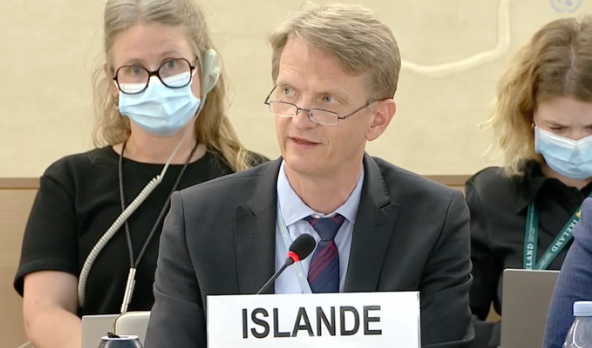 rights situation in Sudan, as more than 100 people have been slain, and thousands have been arrested without cause. To secure broad-based support, Iceland established that a Sudanese-led inclusive dialogue is required. Iceland called on the de facto authorities to put an end to the violence and create an environment conducive to discussion. Lastly, Iceland confirmed that while the removal of the state of emergency and the freeing of detainees are excellent measures, there is still much more to be done, reiterating the stance of the UK.
rights situation in Sudan, as more than 100 people have been slain, and thousands have been arrested without cause. To secure broad-based support, Iceland established that a Sudanese-led inclusive dialogue is required. Iceland called on the de facto authorities to put an end to the violence and create an environment conducive to discussion. Lastly, Iceland confirmed that while the removal of the state of emergency and the freeing of detainees are excellent measures, there is still much more to be done, reiterating the stance of the UK.
The statement by the delegate for the United States of America, condemned violence against peaceful protestors and unjust detentions, and demanded that those guilty be held accountable. Likewise, it demanded the immediate release of all individuals who have been wrongfully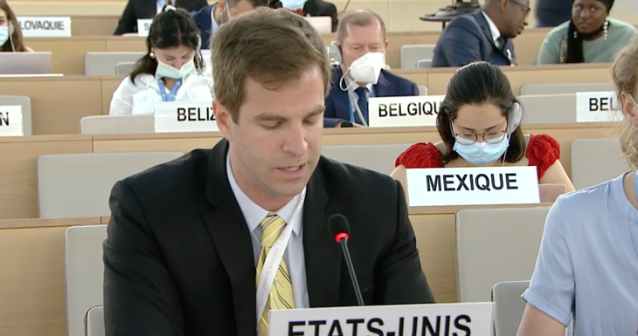 imprisoned, including activists and civil society leaders. It was noted during the statement that Sudan's democratic transition must be driven by civilians and follow through on promises of justice, prosperity, and peace. Military control was deemed unacceptable to the Sudanese people, and not sustainable.
imprisoned, including activists and civil society leaders. It was noted during the statement that Sudan's democratic transition must be driven by civilians and follow through on promises of justice, prosperity, and peace. Military control was deemed unacceptable to the Sudanese people, and not sustainable.
Various non-governmental organisations (NGOs) took part in the dialogue and applauded the report on Sudan's human rights situation since the military coup in October 2021. Similarly, they welcomed Sudanese authorities' decision on 29 May 2022 to lift the state of emergency that was established following the military takeover. NGOs highlighted reports of recent allegations that security agents continue to deploy disproportionate force against nonviolent demonstrators. Since last year's coup, government forces have committed continuous human rights violations, including illegal executions, arbitrary arrests and detentions, torture, and enforced disappearances. Despite the 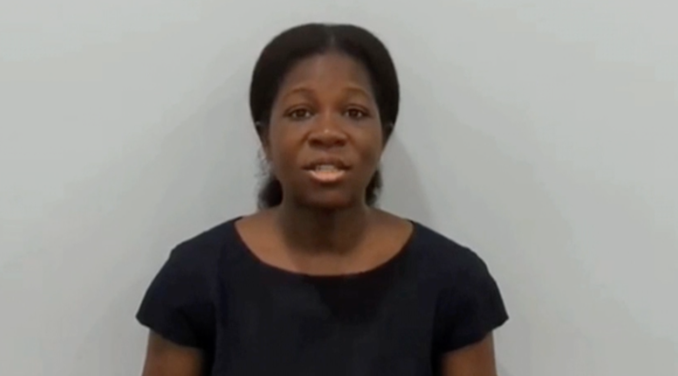 government's claims that it is looking into these acts, various NGOs observed that only one has been held accountable to date. They further observed that, more than three years after the violent attack on nonviolent protests on June 3rd 2019, victims and their families have yet to receive justice.
government's claims that it is looking into these acts, various NGOs observed that only one has been held accountable to date. They further observed that, more than three years after the violent attack on nonviolent protests on June 3rd 2019, victims and their families have yet to receive justice.
Many other states and organisations took part in the dialogue, including South Sudan, France, Egypt and the Russian Federation. However, the overall sentiment was shared amongst all speakers, as they encouraged the end of the state of emergency and actions taken by the state to better its human rights situation. Many states recognised that despite the cessation of the state of emergency, there was still much concern for many fundamental rights and freedoms, including the right to privacy, the right to vote, freedom of expression, freedom of religion or conscience, freedom of assembly and freedom from torture, inhumane or degrading treatment and slavery. Likewise, states discouraged and denounced the imposition of monitoring systems that go against the fundamental values of respect for sovereignty, non-interference in the internal affairs of States, and the free exercise of peoples' right to self-determination. The high number of reported violent attacks against peaceful protestors, human rights advocates, and journalists, as well as the over 200 people killed in intercommunal conflict in Darfur, sexual and gender-based violence, as well as arbitrary detentions, drew the attention of Australia, Iceland, and the European Union. They demanded that the military authorities in Sudan put an end to their campaign of brutality against people right away, release everyone who has been jailed since October 25th, and stop using force against peaceful protestors and human rights advocates, particularly women. Malawi reaffirmed the necessity of ensuring victim compensation as well as accountability for all crimes against those responsible.
Conclusion
Many of the achievements made by the Sudanese transitional government in terms of strengthening respect for and protection of human rights, such as legal and institutional reform, transitional justice, civic space, equality and non-discrimination, and women's rights, have been destroyed by the coup. Since the coup, a pattern of human rights breaches have emerged, including the joint security forces' recurrent use of excessive and fatal force to disperse peaceful protesters, massive arbitrary arrests and detention without due process, and sexual violence.
Geneva International Centre for Justice (GICJ) welcomes the High Commissioner’s report and its recommendations which call on the international community to engage with the Sudanese authorities, and support initiatives that will lead to the reinstatement of a civilian-led transitional government. GICJ encourages ongoing initiatives aimed at bringing about durable political solutions in Sudan that promote the protection of human rights for all. GICJ condemns all abuses of human rights perpetrated by the military and all other parties to the conflict in Sudan. It is imperative that Sudan forms a strong political foundation and implements democratic processes based on principles of fundamental human rights. Sudan’s Constitution is the cornerstone of democracy, and the government must uphold all rights set out in the Bill of Rights. GICJ welcomes the end of Sudan’s state of emergency, and hopes it will put an end to abuses of power perpetrated by national security forces. Citing data and evidence about human rights violations and abuses, including sexual and gender-based violence and enforced disappearances, patterns of mass arbitrary arrests of protestors, excessive force used against protesters we express concern. We further observe that no one has been held accountable for the victims' and their families' losses more than three years after the violent attack on peaceful protestors on 3 June 2019. The utter impunity for violations of human rights is worrying and therefore, we ask the Council to call on the Government of Sudan to launch timely, thorough, impartial, independent investigations into the alleged abuses of human rights and to prosecute those accountable.
Sudan, Coup, Human Rights, Democracy, Freedom, Political Unrest, United Nations, Justice, Geneva, Geneva International Centre for Justice, GICJ




